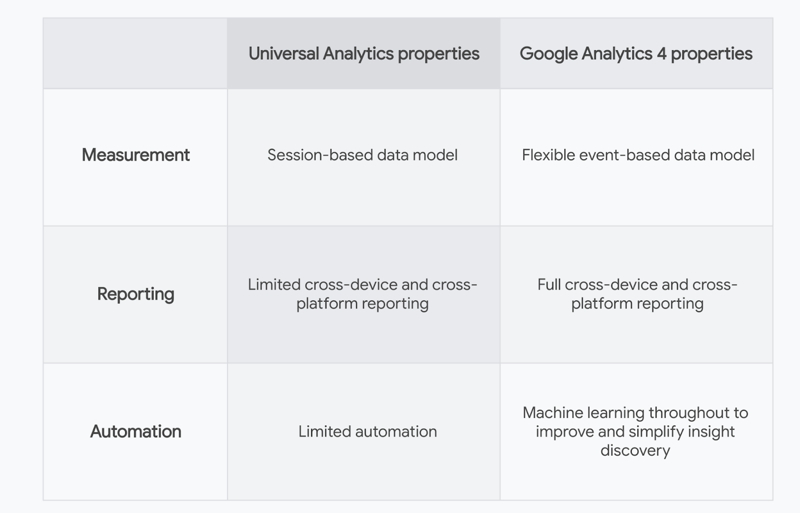

Google Analytics 4, or GA4 for short, is the latest version of Google Analytics, providing hotels a unique opportunity to improve their tracking and analysis capabilities. With Google sunsetting its Universal Analytics (UA) property, it’s imperative for hoteliers to know how to properly implement and utilize GA4.
What is GA4?
Google Analytics 4 is built on a new data model that is more flexible and scalable than its predecessor, Universal Analytics. It is designed to provide more comprehensive insights into user behavior across multiple devices and platforms, including mobile apps and web pages.
Implementing GA4 can be complex, and there are some drawbacks to the platform. In this article, we’ll discuss the differences between GA4 and UA, how hotels can get setup on Google Analytics 4, and some of the common pitfalls to avoid.
On July 1, 2023, standard Universal Analytics properties will no longer process data. You’ll be able to see your Universal Analytics reports for a period of time after July 1, 2023. However, new data will only flow into Google Analytics 4 properties.
Google
Google Analytics 4 Versus Universal Analytics
The main differences between the GA4 and UA properties are centered around the way that data is collected and organized.
- UA data is organized into sessions and pageviews, with each pageview representing a user’s visit to a particular page on a website.
- GA4 uses events to track user interactions with a website or app. Events can be customized to track a wide range of user actions, including clicks, form submissions, and video views.
Another major difference between GA4 and UA is the way that data is processed and analyzed.
- UA relies on server-side processing to calculate metrics such as bounce rate and time on page.
- GA4 uses a combination of server-side and client-side processing to provide real-time insights into user behavior, which allows GA4 to provide more accurate and up-to-date data than UA.

Finally, GA4 offers several new features that are not available in UA. These include:
- Enhanced cross-device tracking,
- Machine learning capabilities for predictive analytics,
- and more advanced data visualization tools.
Google Analytics 4 also allows businesses to track conversions across multiple platforms, including websites, mobile apps, and offline interactions.
Overall, GA4 represents a significant improvement over UA in terms of its flexibility, scalability, and data tracking capabilities. While there may be some initial challenges in transitioning from UA to GA4, the benefits of the new platform are likely to outweigh any short-term difficulties. But, it’s important to know what to do and what to avoid when implementing GA4 for hotels if you want to get the most out of your data.

GA4 Implementation Checklist for Hotels
1. Set Up Your GA4 Account Correctly
The first step in implementing Google Analytics 4 is to create a new GA4 account. To do this, you’ll need to have a Google account and access to your website’s source code. Once you have created your GA4 account, you’ll need to configure the data streams that will send data to GA4. This includes setting up a stream for your hotel’s website and any other relevant data sources, such as mobile apps or booking systems.
It’s important to set up your GA4 account correctly from the beginning, as it can be difficult to make changes later. Take the time to ensure that your data streams are configured properly and that you have included all relevant data sources.
Some helpful tips:
- Choose if the stream is a web, iOS app, or Android app.
- Add a stream name and the stream URL.
- Add the newly created measurement id to your GTM container or place directly on your hotel website.
- Repeat for as many sites or apps that you want to track together.
2. Define Your Goals and Events
One of the advantages of using Google Analytics 4 is the property’s enhanced event tracking capabilities. With GA4, you can track events such as clicks, video views, and form submissions more accurately. However, in order to take advantage of these features, you’ll need to define your goals and events correctly.
Start by identifying the goals you want to track, such as website conversions or bookings. Then, define the specific events that will help you track those goals, such as button clicks or form submissions. Make sure that you have a clear understanding of the events you want to track and how they relate to your business goals.
3. Avoid Common Implementation Pitfalls
While implementing GA4 can be beneficial for hotels, there are several common pitfalls you’ll want to avoid.
- Not tracking the right data: Be sure to track the data that is most relevant to your hotel, including but not limited to website traffic, conversions and revenue. Avoid tracking additional data that might cloud your hotel marketing or business decisions.
- Not setting up filters: Filters allow you to exclude or include certain data from your reports. Ensure your filters are in place for accurate and relevant data.
- Not setting up custom dimensions: Custom dimensions allow you to track additional data that is not included in the default GA4 data model. Make sure that you have set up custom dimensions correctly to capture the data that is most relevant to your business.
4. Use GA4 to Optimize Your Hotel Business
Once you have started collecting data in Google Analytics 4, you can begin using it to drive your hotel marketing decisions. GA4 provides a wealth of insights into user behavior, website traffic, website engagement and more.
Utilize these insights to improve your website content and user experience, target your marketing campaigns more effectively, and make data-driven decisions about your hotel.
Getting Started with GA4
Are you ready to get started with Google Analytics 4? Our expert analysts are here to help. Contact us today for help implementing GA4 on your hotel website.
About TravelBoom Marketing
TravelBoom specializes in developing and executing customized data-driven marketing solutions that drive direct bookings and growth for its clients. With over 25 years of experience in digital marketing for travel and hotels, TravelBoom leverages advanced data science and analytics to uncover insights and develop strategies that greatly enhance results for our clients and reduce reliance on third-party channels. TravelBoom is also host of the world’s #1 ranked Hotel Marketing Podcast and its quarterly Traveler Sentiment Study both of which can be found at www.travelboommarketing.com.